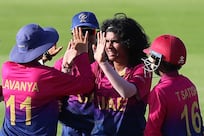DUBAI // Young Arab filmmakers are setting the trend at the fourth Gulf Film Festival, portraying home-grown stories with often intense messages through their camera lens.
The event, which began last night, will showcase 153 films from 31 countries - including 45 Emirati titles - until April 20 at the Grand Cinema in Dubai Festival City.
Child Of Iraq, by Ala'a Mohsen, opened the festival. It depicts the director's return home to Iraq after 14 years in Denmark.
"I wanted to show the whole identity crisis I went through when I felt I was Danish but my parents wanted me to stick to my Iraqi roots," said the 22-year-old director.
"I had a lot of mixed emotions and you can see it through the camera," he said. "I wanted to investigate the problem of identity crisis."
Mohsen left Iraq for Denmark at age five because of the conflict and war that ravaged the country. He said the main issue he faced was keeping his parents happy regarding his heritage, while at the same time integrating into Danish society. The pressure from his parents eventually prevailed and he travelled back to Al Diwaniyah, his hometown in southern Iraq, three years ago.
Mohsen used his camera as a therapeutic tool to document his experience.
"I thought I could make a documentary out of the psychological troubles I was going through concerning my identity," he said.
"It was so hard for me to leave my extended family in Iraq and you can see through my camera when I first meet them again, the cousins I used to play with as a child, it was emotional."
He said even when speaking Arabic, Iraqis would sense he was not a local. He had the same feeling as an outsider while living in Denmark. "It's a well-known identity crisis living in Europe as an Arab."
Mohsen said opening the Gulf Film Festival with Child Of Iraq, a 53-minute documentary filmed over two months, was "unbelievable because people will always remember you as the first film".
He has produced two films in the past; one about mainstream Danish society, while the other portrays the story of a Danish citizen who converts to Islam.
Khadija al Salami's documentary Destructive Beast looks at the impact of corruption on the Yemeni population and focuses on the young people in the country.
The film delves into the corrupt dealings of municipalities, small businesses and government and those who were investigated by her project took exception, which meant filming was interrupted due to the objections she faced.
"Yemen is unfortunately a corrupt country and what's happening now is partly because of it," she said. "My film gives examples of small and big corruption in the country and how it's destroying it, from the municipality to the politicians."
Even though Al Salami suffered setbacks, she persisted and is adamant in her desire to show the world her on-the-ground account of corruption in Yemen.
"We talk about extortion and we know it happens but I wanted to put it out there to discuss it," she said. "We must find a solution to this because it's a sad situation; nothing can be done without paying and I want to raise awareness."
The 47-minute documentary will make its world premiere tomorrow night.
Al Salami was also the only Yemeni participant in the Dubai International Film Festival with Amina, the story of a female Yemeni prisoner based on real events. Her film succeeded in freeing Amina from prison.
Amina bin Dasmal is the first Emirati woman to have started an international film production company, Al Cove, in the UK and she hopes her supernatural thriller The Caller will be a hit at the festival.
The 100-minute film is about a troubled divorcee tormented by a series of mysterious calls. The woman then realises the calls are coming from the past, a prospect that unsurprisingly frightens her.
"I thought there was something really interesting with this film from the perspective of a new idea, something that hasn't necessarily been seen on screen," she said.
Along with her fellow producer, Robin Fox, the pair shot the film in Puerto Rico last year over five weeks and hope to produce more "international films with an Arab character".
Bin Dasmal said she had a strong desire to be a part of the festival "to showcase the work of Emirati producers. It really complements the festival and I am excited because it's always great to be supported by your own country."
The Caller is part of the Lights segment and it will make its Middle East premiere tonight.





